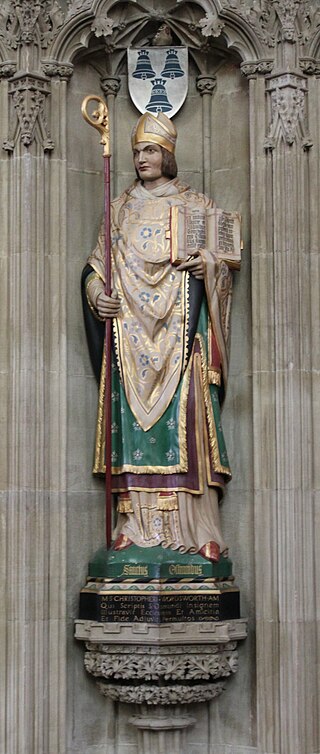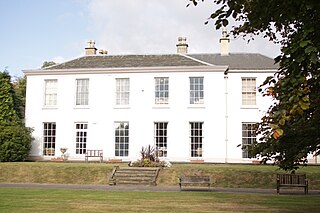
Wycliffe Hall is a permanent private hall of the University of Oxford affiliated with the Church of England. It is named after the Bible translator and reformer John Wycliffe, who was master of Balliol College, Oxford in the 14th century.

Osmund, Count of Sées, was a Norman noble and clergyman. Following the Norman conquest of England, he served as Lord Chancellor and as the second bishop of Salisbury, or Old Sarum.
David Staffurth Stancliffe is a retired Church of England bishop. He was Provost of Portsmouth Cathedral from 1982 to 1993, and the Bishop of Salisbury from 1993 to 2010. He is the third generation of his family to serve the ordained ministry.

The Queen's Foundation for Ecumenical Theological Education is an ecumenical theological college which, with the West Midlands Ministerial Training Course, forms the Centre for Ministerial Formation of the Queen's Foundation for Ecumenical Theological Education. It serves the Church of England and the Methodist Church, and its courses thus have a strong ecumenical emphasis.

St John's College, Nottingham, founded as the London College of Divinity, was an Anglican and interdenominational theological college situated in Bramcote, Nottingham, England. The college stood in the open evangelical tradition and stated that its mission was "to inspire creative Christian learning marked by evangelical conviction, theological excellence and Spirit-filled life, that all who train with us might be equipped for mission in a world of change".

Ripon College Cuddesdon (RCC) is a Church of England theological college in Cuddesdon, a village 5.5 miles (8.9 km) outside Oxford, England. The College trains men and women for ministry in the Church of England: stipendiary, non-stipendiary, local ordained and lay ministry, through a wide range of flexible full-time and part-time programmes.
Wesley College was a theological college in the Henbury area of Bristol, England, between 1946 and 2012. As the successor to an institution established in London in 1834, it was the oldest provider of theological education for the Methodist Church of Great Britain. The college was the core institution of the South West Regional Training Network of the Methodist Church, where its partners were the South West Ministerial Training Course in Exeter and the Southern Theological Education and Training Scheme in Salisbury. It was also involved with ecumenical education.

Sarum College is a centre of theological learning in Salisbury, England. The college was established in 1995 and sits within the cathedral close on the north side of Salisbury Cathedral.

Westcott House is an Anglican theological college based on Jesus Lane in the centre of the university city of Cambridge in the United Kingdom. Its main activity is training people for ordained ministry in the Church of England and other Anglican churches. Westcott House is a founding member of the Cambridge Theological Federation. The college is considered by many to be Liberal Catholic in its tradition, but it accepts ordinands from a range of traditions in the Church of England.
Alistair James Magowan is a British retired Anglican bishop. He served as the Bishop of Ludlow — the sole suffragan bishop of the Church of England Diocese of Hereford — from 2009 until his 2020 retirement.

Wells Theological College began operation in 1840 within the Cathedral Close of Wells Cathedral. It was one of several new colleges created in the nineteenth century to cater not just for non-graduates, but for graduates from the old universities who wished to receive specialist clerical training in preparation for ordination into the Church of England. It was founded by Bishop Law.

St Mellitus College is an English theological college established in 2007 by the Diocese of London and the Diocese of Chelmsford of the Church of England. It has campuses in Earl's Court, Chelmsford, Plymouth, and Nottingham, with growing links with other churches, colleges and dioceses throughout the United Kingdom and beyond. The president is Graham Tomlin, Bishop of Kensington, and the dean is Russell Winfield. St Mellitus College is a wholly non-residential college and has pioneered context-based training within the Church of England, integrating academic theological study with ministry placements throughout the course of study. As of 2019, it is the largest ministerial training college in the Church of England.
Vernon Philip White is an English Anglican priest and theological scholar.

Jonathan Lee Draper is an American Anglican priest, theologian, and academic. Since 2017, he has been the general secretary of Modern Church. From 2012 to 2017, he was the dean of Exeter, at Exeter Cathedral in the Church of England Diocese of Exeter.
Alan Paul Jeans is a British Anglican priest. He has been the Archdeacon of Sarum, in the Church of England Diocese of Salisbury, since 2003.

Andrew Chan Au-ming is the Archbishop of Hong Kong and Primate of Hong Kong Sheng Kung Hui since January 2021 and the Bishop of its Western Kowloon diocese since March 2012. He was ordained as deacon in 1991 and priest in 1992. He was priest-in-charge of Holy Spirit Church, vicar of St. Luke's Church and the first Chinese dean of St. John's Cathedral.
Judith Diane Maltby is an American-born Anglican priest and historian, who specialises in post-Reformation church history and the history of early modern Britain. She has been the chaplain and a Fellow of Corpus Christi College, Oxford, since 1993, and reader in church history at the University of Oxford since 2004.
Bruce Duncan, is a retired Anglican priest, chaplain, and academic administrator. From 1995 to 2002, he was the first Principal of Sarum College, an ecumenical theological college in Salisbury, England.
The Scottish Episcopal Institute (SEI) is the theological college of the Scottish Episcopal Church, the Anglican church in Scotland. It provides training and theological education to those preparing for lay and ordained ministries in the Scottish Episcopal Church. It also provides training for leaders of the United Reformed Church. The SEI was formally launched in October 2015, and replaced the Theological Institute of the Scottish Episcopal Church.
Catherine Ann Sourbut Groves is a British Anglican priest. Since November 2020, she has served as Archdeacon of Lindisfarne in the Church of England Diocese of Newcastle. She had previously worked in academia and administration at the University of Bath, and in parish ministry in the Diocese of Bath and Wells.










